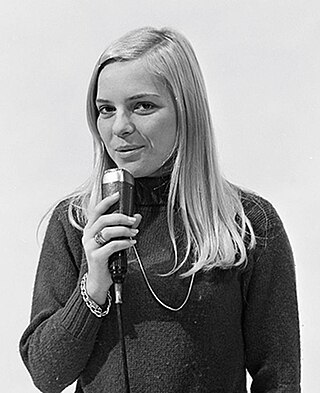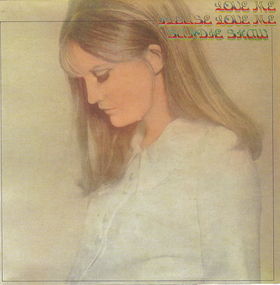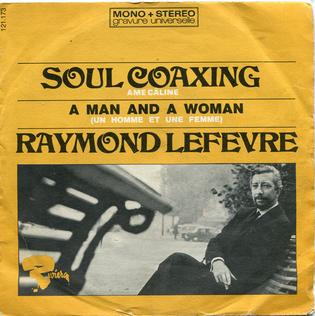
Isabelle Geneviève Marie Anne Gall, known professionally as France Gall, was a French yé-yé singer. In 1965, at the age of 17, she won the tenth edition of the Eurovision Song Contest with the song "Poupée de cire, poupée de son", representing Luxembourg. Later in her career, she became known for her work with singer-songwriter Michel Berger, whom she married in 1976. Her most successful singles include "Résiste", "Ella, elle l'a" and "Évidemment".
Yé-yé or yeyé was a style of pop music that emerged in Western and Southern Europe in the early 1960s. The French term yé-yé was derived from the English "yeah! yeah!", popularized by British beat music bands such as the Beatles. The style expanded worldwide as the result of the success of figures such as French singer-songwriters Sylvie Vartan, Serge Gainsbourg and Françoise Hardy. Yé-yé was a particular form of counterculture that derived most of its inspiration from British and American rock and roll. Additional stylistic elements of yé-yé song composition include baroque, exotica, pop, jazz and the French chanson.

Michel Polnareff is a French singer-songwriter, who was popular in France from the mid-1960s until the early 1990s with his penultimate original album, Kāma-Sūtra. He is still critically acclaimed and occasionally tours in France, Belgium and Switzerland.

Keith Stuart Brian Reid was an English lyricist and songwriter.

Love Me, Please Love Me is the third original album or LP by 1960s British singer Sandie Shaw. It was issued by Pye Records in November 1967, several months after Shaw's triumph in that year's Eurovision Song Contest. The album mainly contains cover versions of popular songs made by other artists, like Michel Polnareff's "Love Me, Please Love Me", even though two songs are written by Chris Andrews, who was Shaw's personal songwriter for much of the 1960s.
Caravelli was a French orchestra leader, composer and arranger of orchestral music.

"Hymne à l'amour" is a popular French song originally performed by Édith Piaf.
"The Way of Love" is a song written by Jacques ("Jack") Dieval, with English lyrics by Al Stillman. It was originally a 1960 French song titled "J'ai le mal de toi", and it was first recorded in English by Kathy Kirby in 1965. The best-known English version was by Cher whose recording reached No. 7 in the US.

"Ne me quitte pas" is a 1959 song by Belgian singer-songwriter Jacques Brel. It has been covered in the original French by many artists and has also been translated into and performed in many other languages. A well-known adaptation, with English lyrics by Rod McKuen, is "If You Go Away".

"La Poupée qui fait non" is a 1966 song written by Franck Gérald (lyrics) and French singer/songwriter Michel Polnareff (music). It was recorded by Polnareff, becoming an immediate success in France and one of Polnareff most definitive songs. Jimmy Page played guitar on the recording. It also appeared as the last track in his album Love Me, Please Love Me.
Frédéric Botton was a French lyricist and composer.

Frédéric François, is a French-speaking singer-composer living in Belgium.
"Rockollection" is a 1977 French pop song composed and performed by Laurent Voulzy. Alain Souchon contributed the lyrics.

Bulles is an album by French singer-songwriter Michel Polnareff released in 1981.
With this album, the singer found more success, as it sold 800,000 copies. "Radio", "Je t'aime", and "Tam-Tam" were put into heavy rotation on French radio stations. Although mostly rock-oriented, Polnareff maintains his personality lyrically and musically. In 2001, the album was re-issued by Universal-Polygram.

"Fan" is a 2003 song recorded by French singer and composer Pascal Obispo. Written by Lionel Florence who had previously worked for many notable artists, the song is a tribute to great artists, particularly Michel Polnareff. Released on March 14, 2003, as the lead single of the album of the same name, "Fan" achieved great success in France and Belgium (Wallonia), becoming to date Obispo's first number-one hit and his most successful single in terms of chart peak positions. The song was also performed during the singer's next tours and was thus included on the albums Studio Fan / Live Fan (2004) and Les Fleurs de Forest (2007).

"Soul Coaxing" or "Âme câline", written in 1967 by French singer/songwriter Michel Polnareff, provided Raymond Lefèvre and His Orchestra with a 1968 instrumental hit.
Régine Hantelle, better known by her stage name Anaïs, is a French singer.
Les Sultans was a French Canadian music band greatly affected by the British invasion of sixties, American folk-rock tradition and French yé-yé pop of the sixties. It was formed in Saint-Hyacinthe, Quebec in 1964 in and was a greatly successful band until its disbanding in 1968.

"Adiós Amor" is a 1967 hit French-language song by French singer Sheila. It was one of the series of four hit singles in 1967 which made her best-selling artist of the year. Lyrics were by Jacques Plante, music by Claude Carrère and the recording was produced by American Sam Clayton. The song begins "Je ressens de l'amour pour toi."
This is the discography of French singer Michel Polnareff.












